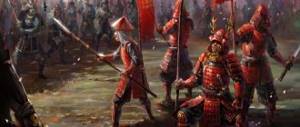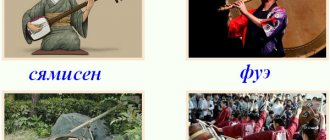Japanese proverbs
1. If a problem can be solved, don't worry about it. If a problem cannot be solved, there is no point in worrying about it.
2. A husband and wife should be like a hand and eyes: when the hand hurts, the eyes cry, when the eyes cry, the hand wipes away the tears.
3. When a person is in love, even smallpox scars are as beautiful as dimples on the cheeks.
4. Check seven times before you doubt a person.
5. Cold tea and cold rice are tolerable, but cold eyes and cold words are unbearable.
6. The tongue is only 7.5 centimeters long, but it can kill a person 1.80 m tall.
7. We learn little from victories and much from defeats.
8. The reputation of a thousand years can be determined by the behavior of one hour.
9. If you understand everything, then you are misinformed.
10. Happiness always comes to a house where there is laughter.
11. Even monkeys can fall from trees.
12. No arrow is shot into a smiling face.
13. A bad master will never make a perfect vase.
14. Victory is achieved by the one who endures half an hour longer than his opponent.
15. A journey of thousands of kilometers begins with one step.
16. If you ask, you will be ashamed for one minute, but if you don’t ask, you will be ashamed for the rest of your life.
17. Having thought, make up your mind, but having decided, don’t think.
Books on the topic “Japanese Proverbs”
The book “Japanese proverbs and sayings and their Russian analogues”
The book “Japanese proverbs and sayings and their Russian analogues” in electronic and paper formats on liters
The book “Japanese proverbs and sayings and their Russian analogues”
Compiled and translated by L. Yu. Khronopulo Publisher: Karo, 2019 Volume: 289 pp.
The book is a collection of the most commonly used proverbs in modern Japanese, grouped by topic. The book is intended for students of the Japanese language and those interested in Japanese culture.
The book “Japanese proverbs and sayings and their Russian analogues”
The book “Japanese proverbs and sayings and their Russian analogues” in paper format in the “Labyrinth”
The book “Japanese proverbs and sayings and their Russian analogues”
Compiled and translated by L. Yu. Khronopulo Publisher: Karo, 2019 Volume: 289 pp.
A unique edition of Japanese proverbs, illustrated by talented artists.
You will be surprised and delighted by the subtle wisdom captured by artists in unexpected images with humor, grace and national flavor.
For those who want to practice the Japanese language, all variants of writing proverbs are presented - in Japanese using hieroglyphs, hiragana characters, Latin transcription, translation and Russian analogue.
The book is intended for students of the Japanese language and those interested in…
The book “Japanese wisdom. One Hundred Japanese Proverbs and Sayings”
The book “Japanese wisdom. One Hundred Japanese Proverbs and Sayings” in paper format in “Labyrinth”
The book “Japanese wisdom. One Hundred Japanese Proverbs and Sayings”
Translator: Afonkin Sergey Yuryevich Publisher: SZKEO, 2021 Volume: 160 pp.
A collection of Japanese proverbs with illustrations by artist Kyosai Kawanabe. Kyosaya Kawanabe was born in 1831 into a samurai family. He is considered one of the most famous artists of the kyoga (“crazy pictures”) genre.
Also on topic
The Story of William Adams, the First Englishman in Japan
Japanese aphorisms about love
Japanese wisdom about love - wisdom from the Land of the Rising Sun
Once they asked a teacher how one can recognize a spiritual person. And the teacher replied: “It is not what he says, and not what he appears to be, but the atmosphere that is created in his presence. That's what evidence is. For no one is able to create an atmosphere that does not belong to his spirit.
Proverbs from Japan: part 3
Japanese proverbs in G
The fortuneteller does not know his fate. (Before pointing out the shortcomings of others, correct your own)
Where unreason reigns, reason hides.
Where people grieve, you grieve too.
Where there is no sense of duty and human eyes, everything is possible.
Where might is right, right is powerless.
It is better for the general of a defeated army not to talk about battles. 敗軍の将は兵を語らず
The wind will not break a flexible willow. 柳に風折れなし
Deep rivers flow silently. 深い川は静かに流れる
Your anger is your enemy. 怒りは敵と思え
The head is lamb, and the meat is dog. (About deceptive appearance) 羊頭狗肉
The head is a dragon and the tail is a snake. (Loud beginning and inglorious end) 竜頭蛇尾
A rude man, like a falcon, must be educated. 下種と鷹とに餌を飼え
A hungry dog is not afraid of a stick.
States perish, but mountains and rivers remain.
- Name Lisa in Japanese
- Japanese swimwear from LEOHEX
- Tibetan proverbs
Idioms and set expressions of Japanese about love
Idioms and set expressions of Japanese about love. This selection is taken from Tokado. A mandatory link to the Tokado group or the publisher's website is required!
The thematic selection is dedicated, as many have already guessed, to the feeling of love, in its most varied manifestations. Below is a list of quite popular common idioms and common expressions.
Love shortens the distance
はなれていることがおたがいのじょうあいをよりふかめる) – distance only strengthens the feeling
相思相愛(そうしそうあい)- an idiom that means two people are deeply in love with each other
琴瑟相和(きんしつそうわ) - to be happy in marriage, this is what they say about a couple who harmoniously complement each other
海誓山盟(かいせいさんめい)- oath of love, which is as unchanging as sea-mountains and as majestic
才子佳人(さいしかじん) is a talented man and a beautiful woman. Another option to describe a beautiful couple.
偕老同穴(かいろうどうけつ) – and another option to characterize a couple, this time this couple, characterized using this idiom, seems happy to the speaker
恋愛結婚(れんあいけっこん) – marriage for love
Well, love is blind. our version: love is evil
Love makes everyone equal (all ages are submissive to love)
Love comes without a reason. Love doesn't need reasons
Love doesn't need teachers
and another stable idiomatic expression 忍ぶ恋(しのぶこい)- secret love, secret love
Once again, a small repetition: when copying this content, a link to this publication or Tokado’s publication is required.
If you find an error, please select a piece of text and press Ctrl+Enter.
Source
LiveInternetLiveInternet
—Photo album
—Tags
-Music
—Categories
- Japanese (78)
- Quotes (73)
- Videos (70)
- This is funny ^^ (56)
- Photoshop (54)
- My Dog (40)
- Everything else ^^ (40)
- JE (39)
- Useful (37)
- Japan and everything connected with it (37)
- Recipes and cooking (29)
- FlashMobs (24)
- Smileys =) (22)
- Games and flash drives (17)
- Drawing lessons (14)
- Tests (14)
- College (13)
- My drawings (12)
- Drama (7)
- Photos (6)
- Watched/read lists (6)
- Pictures (6)
- IF ^^ (3)
- Baby rats (1)
- My dreams (0)
—Search by diary
—Subscription by e-mail
-Statistics
Proverbs from Japan: part 6
Japanese proverbs in I
And Confucius was not always lucky. (Simplicity is enough for every wise man)
Both good and evil are in your heart.
And water spills from deft hands. (And there is a hole in the old woman)
And the stone can let it slip.
And the kappa drowns. (A horse has four legs, but it stumbles) 河童の川流れ
And the moth lives its whole life.
And the wise man is wrong once out of a thousand times.
And monkeys fall from trees. (A horse has four legs, but it stumbles) 猿も木から落ちる
And one falling leaf heralds the coming of autumn. 一葉落ちて天下の秋を知る
And a fool can be useful.
The one who goes forward guides others.
You can't shoot mice with a bow that weighs a thousand kanas. (Shoot sparrows from a cannon)
Of the vices, the greatest is debauchery; of the virtues, the highest is filial duty.
Excessive politeness turns into flattery.
Sometimes running away means winning. 逃げるが勝ち
True patience is the kind of patience when it is impossible to endure. ならぬ堪忍するが堪忍
Disappear like foam on water. (Go to dust) 水の泡となる
He is looking for something sweet, but there is a pie on the shelf.
Also on topic
Conversations about Bushido: Hagakure – Subordinates
Japanese proverbs in Japanese, with translation into Russian
The Japanese proverbs for this article are partially taken from the Japanese Wikiquote. As in any language, proverbs and sayings play a significant role in human life. They add a unique flavor to a person’s speech and contain folk wisdom that has evolved over years, or even centuries. And even though nowadays we do not often say proverbs out loud when communicating with each other, their meaning is constantly present in our lives.
When you don’t want to share your joy with others, the thought “happiness loves silence” plays in your head, and when you make a mistake in something, you think “if I knew where to fall, I would have laid out straws.” I also have my favorite Japanese proverbs, which I repeat in appropriate situations, and one of them, which I understood over time and now it’s like a lifesaver when I have a lot of work to do:
Fast is slow, but without a break
Having spoken it, vanity and nervousness disappear as if by magic. In everything that you would not like to achieve, you do not need to storm mountains, you need to slowly and surely move towards your intended goal. For others it may be different. I'm talking about my feelings.
A motivating Japanese proverb for me is:
A journey of a thousand ri begins with the first step
There is also one wonderful statement by the Japanese athlete Antonio Inoki.
Don't be afraid for the result. If you take a step forward, your steps will create the path themselves.
Well, now Japanese proverbs about life, friendship, war and simply proverbs containing the centuries-old wisdom of the people.
For those who want to practice the Japanese language, all options for writing proverbs are listed - in their original form - in Japanese, i.e. using hieroglyphs, repetition of proverbs in Japanese hiragana characters, transcription - romaji and translation from Japanese into Russian.
And if you want to learn how to read and write in Japanese on your own, then I recommend you the online Japanese language school “Ikigai”, where you will not only learn the basics of the language, but also learn a lot of interesting things about the mysterious and original Japan.
- 弱り目に祟り目/ よわりめにたたりめ/ yowarimenitatarime - Trouble after trouble. Other options adapted to the Russian language: trouble has come, open the gate, trouble does not come alone.
- People with the same disease sympathize with each other. The unfortunate understand each other.
- 三日坊主 / みっかぼうず / mikkabouzu - Bonza for 3 days (about those who quickly give up what they started). Seven Fridays a week.
- To be bitten by your own dog (Warm the snake on your chest).
- Onimojūhachibanchamodebana - At eighteen, even a demon is attractive, and the first brew of even bad tea is fragrant.
- 氏より育ち / うじよりそだち/ Ujiyorisodachi - Education is more important than origin
- 出る杭は打たれる / でるくいはうたれる / Derukuihautareru - The protruding stake will definitely be driven in / The protruding nails will be driven in. (No need to stick your head out)
- Ikarihatekitoomoe - Your anger is your enemy
- 千里の道も一歩から / senri no michi moippokara - The path of a thousand ri begins with the first step. (Down and Out trouble started).
- 鬼に金棒 / おににかなぼう / Oninikanabō - Give the devil a metal rod (about strengthening the power of someone who is already strong).
- Bakanitsukerukusurihanai - There is no cure for fools. There is no cure for stupidity.
- 論より証拠 /ろんよりしょうこ / ronyorishouko - Evidence is better than reasoning. (Facts are stubborn things)
- - If the fish wants, the water will give way.
- 急がば回れ / きゅうがばまわれ / kyuugabamaware - If you are in a hurry, take a detour. (The quieter you go, the further you'll get).
- Heat and cold end in Higan. (Both heat and cold end before the equinox).
- Tomorrow, tomorrow's wind will blow. (Everything has its time).
- 猫の手も借りたい / ねこのてもかりたい / nekonotemokaritai - So busy that the cat’s help will come in handy. (Busy until the aisle).
- 河童の川流れ / かっぱのかわながれ / kappanokawanagare - And the kappa drowns. (Kappa is a Japanese merman). The horse has four legs and stumbles. Most often, good swimmers drown.
- 猿も木から落ちる / さるもきからおちる / sarumokikaraochiru - And the monkeys fall from the trees. (And there is a hole in the old woman).
- - And one falling leaf heralds the coming of autumn.
- ならぬ堪忍するが堪忍 / ならぬかんにんするがかんにん / Naranukan'ninsurugakan'nin - True patience is the kind of patience when it is impossible to endure.
- 水の泡となる / みずのあわとなる / mizunoawatonaru - Disappear like foam on water. (Go to dust. Go to zero.)
- 三つ子の魂百まで / みつごのたましいひゃくまで / mitsugonotamashiihyakumade - What a soul is at three years old, so is it at a hundred.
- 花より団子 / はなよりだんご / hanayoridango - Dango is better than flowers. (Dango is Japanese rice balls on a stick). (The nightingale is not fed fables.)
- Nodomotosugirebaatsusawowasureru - When you get drunk, you forget about thirst. (When it passes Trouble is, you forget to learn a lesson.)
- Umanihanottemiyohitonihasoutemiyo - Horse one learns by riding, and a person by communicating.
- Monzen'nokozōnarawanukyōwoyomu - A boy living near a Buddhist temple while studying, he reads the sutras.
- 言わぬが花 / いわぬがはな / iwanugahana - Silence is a flower. (Silence is golden. There are things that are better not to be talked about.)
- 知恵者一人馬鹿万人 / ちえしゃーひとばかばんにん / Chiesha 一hitobakaban'nin - For one wise man, there are 10,000 fools.
- 猫に小判 / ねこにこばん / nekonikoban - Need money like a cat. (Cast pearls before swine).
- Rainen'nokotowoiebaonigawarau - Talking about the future makes the devil laugh.
- Suterukamiarebahiroukamiari - One god forgot - another will help.
- - The bargain hunter loses money. (Miser pays twice).
- - As long as you don’t touch God, he doesn’t curse.
- かってかぶとのおをしめよ / kattekabutonoo o shimeyo - After winning, tighten the straps around your neck.
- 堪忍袋の緒が切れる / かんにんぶくろのおがきれる / kanninbukuronoogakireru - Cut the string from the bag with patience. (The cup of my patience has overflowed. Patience has burst.)
- 七転び八起き / ななころびやおき / nanakorobiyaoki - Fall seven times, rise eight times. (Fighting the vicissitudes of fate).
- 能ある鷹は爪を隠す / のうあるたかはつめをかくす / Nōarutakahatsumewokakusu - A strong hawk hides its talons.
- Gossip only lasts for 75 days.
- ikuhaichijinohaji kikanuhaーisshōnohaji - Asking is a shame for a minute, but not knowing is a shame for a lifetime.
- The lost fish seems big.
- 同じ釜の飯を食う / おなじかまのめしをくう / onajikamanomeshi o kuu - Bread from one pot. (Living under the same roof with someone).
- Ryōyakuhakuchininigashi - Good medicine tastes bitter.
- 挨拶より円札 / あいさつよりえんさつ / Aisatsu yori ensatsu - Money is better than friendly words. (Words won't fill you up.)
- 会うは別れの始め / かいうはわかれのはじめ / kaiuhawakarenohajime - Meeting is the beginning of parting.
- 悪銭身につかず / あくせんみにつかず /akusenminitsukazu - Badly acquired goods are not good for future use. Unjust gains will not last long. (Easily gained, easily lost).
- Ashita no hyakuyorikyounogoju - A hundred tomorrow is better than fifty today. (A bird in the hand is worth two in the bush).
- 青菜に塩 / あおなにしお / aonanishio - verbatim. Salt in greens. (if you salt the greens, they give out juice and become flabby). (Be depressed, look pale).
- Chi ni ite, ran o wasurezu - Living in peace, do not forget about war.
- Dare shimawagami wa kawaii - Everyone is dearer to themselves. (Your shirt is closer to your body).
Proverbs from Japan: part 13
Japanese proverbs in C
Flower on top of the mountain. (The eye sees, but the tooth numbs) 高嶺の花
Japanese proverbs starting with H
A man in a coffin - then there is only truth in the world.
A person with a guilty conscience is afraid of everything.
A person does what he loves well.
The riper the ear of rice, the lower it slopes to the ground. (The smarter, the more modest)
What is there to grieve about, what cannot be turned back.
What comes out of the mouth is for the whole world to see. (The word is not a sparrow: if it flies out, you won’t catch it)
You can endure the suffering of others for at least three years. 人の痛いのは三年でも辛抱する
Excessive honesty borders on stupidity.
Japanese proverbs in I
An egg is never square, a street woman is never sincere.
The neighbor's barley tastes better than the rice at home. 中の米の飯より隣の麦飯
✈️ Travel services
Proverbs from Japan: part 7
Japanese proverbs starting with K
There is no shortcut to knowledge.
As soon as the trouble is over, dress up.
The same soul at three years old is the same at one hundred years old. 三つ子の魂百まで
A carp swimming against the current can become a dragon. 鯉の滝登り
Dumplings are better than flowers. (They don’t feed the nightingale with fables) 花より団子
When wild geese soar above, even turtles knock their paws (out of impatience). (The example of talented people often awakens in ordinary people the desire for high things) gan ga tobeba ishigame mo jidanda
When Yin (feminine) reaches its limit, Yang (masculine) is born. (Any extreme develops into its opposite) 陰窮まって陽生ず in kiwamatte yo: sho:zu
When you get drunk, you forget about thirst. (When the danger is over, you forget to learn a lesson from it; having received help from someone, you forget about gratitude.)
When you draw a branch, you need to hear the breath of the wind.
When you talk about tomorrow, the rats in the attic laugh. (Still, everything will not be as we plan) ashita no koto o ieba tenjo: de nezumi ga warau
The end of the chatter is the beginning of the action.
When the rain stops, you forget your umbrella. 雨霽れて傘を忘れる
When money runs out, so does love.
Soot (from oil) is washed off with oil. 油を以て油煙を落とす
Feed a cat even for three years, and in three days it will forget all the good things. 猫は三年飼っても三日で恩を忘れる
Meekness often breaks strength.
There are no large fish in the swamp.
Major betrayal feels like devotion.
He who can swim can also drown.
He who drinks does not know about the dangers of wine; whoever does not drink does not know about its benefits.
Those who were born under the roar of cannonade are not afraid of gun shots.
Anyone who begs for three days will never get out of the habit. 乞食を三日すれば忘れられぬ
He who feels shame also feels duty.
The merchant is the enemy of the merchant.
- Japanese swimwear from LEOHEX
- Korean proverbs
- Asian Funny #5: Weird Japanese TV Shows











